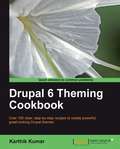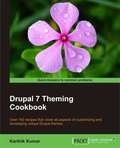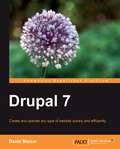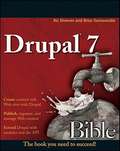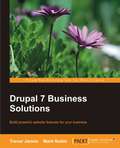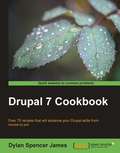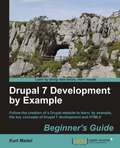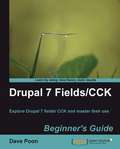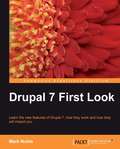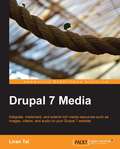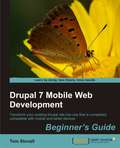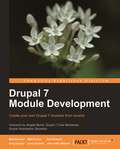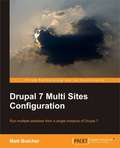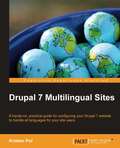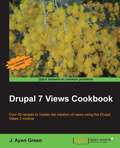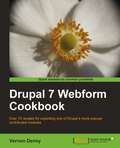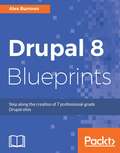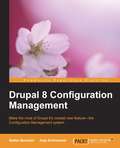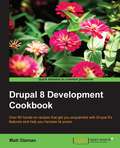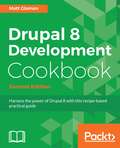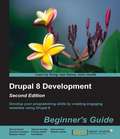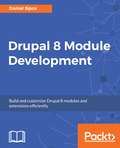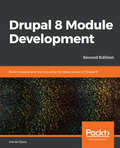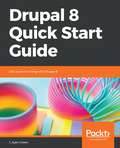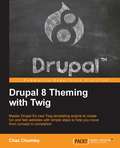- Table View
- List View
Drupal 6 Theming Cookbook
by Karthik KumarWritten in cookbook style, this book offers solutions to all common theme design problems through recipes. Each recipe contains step-by-step instructions followed by the analysis of what was done in each task and other useful information. The book is designed so that you can read it chapter by chapter, or you can look at the list of recipes and refer to them in no particular order. This book is written for Drupal developers who want to refresh the look and feel of their sites. If you are a Drupal site administrator who is looking to go beyond the basics and customize the presentational aspects of your Drupal site, then this book is for you. It assumes that readers are familiar with rudimentary PHP and acquainted with Drupal installation and general usage. Readers are also expected to have knowledge of CSS and XHTML.
Drupal 6 Theming Cookbook
by Karthik KumarWritten in cookbook style, this book offers solutions to all common theme design problems through recipes. Each recipe contains step-by-step instructions followed by the analysis of what was done in each task and other useful information. The book is designed so that you can read it chapter by chapter, or you can look at the list of recipes and refer to them in no particular order.This book is written for Drupal developers who want to refresh the look and feel of their sites. If you are a Drupal site administrator who is looking to go beyond the basics and customize the presentational aspects of your Drupal site, then this book is for you. It assumes that readers are familiar with rudimentary PHP and acquainted with Drupal installation and general usage. Readers are also expected to have knowledge of CSS and XHTML.
Drupal 7
by David MercerThe approach of this book has been revised and updated for Drupal 7 based on comments from thousands of readers. The book takes a pragmatic look at the steps necessary to get a website up and running. Drawing on years of writing experience, David Mercer utilizes a friendly, engaging style that is both clear and concise--perfect for the Drupal newbie. This book is for people with little or no experience in website design, people who are not necessarily familiar with PHP, MySQL or HTML, and above all people with little to no experience in using Drupal. familiar with PHP, MySQL or HTML, and above all people with little to no experience in using Drupal.
Drupal 7 Bible
by Ric Shreves Brice DunwoodieGuidance for administrators, content managers and web publishers on using Drupal for content management Start building and managing web sites with the open-source content management system Drupal 7 and this in-depth guide. Whether you're new to Drupal or migrating from another system, you'll find the tips and techniques you need to understand Drupal, create a new web site, or manage an existing one. Learn how to create, modify, and delete items-and much more-with the detailed tutorials in this step-by-step guide. Teaches you how to use a Drupal site, as well as how to set up, configure, and customize a new site, including obtaining code and deploying it to a server Covers advanced topics like multilingual content management, publishing workflows, or Views and Panels Shows you how to work with Drupal 7's new fields and custom content types Get on the Drupal bandwagon with this complete guide.
Drupal 7 Business Solutions
by Mark Noble Trevor JamesThis book takes a step-by-step approach to building a complete business website using Drupal and enhancing it to include modern technology used by cutting-edge companies. All instructions are written in such a way that they make sense to readers of any technical level. This book is for anyone who wants to learn how to set up a website quickly for their business using the super powerful Drupal open source content management software.
Drupal 7 Cookbook
by Dylan Spencer JamesAs part of Packt's cookbook series, this book is packed with practical recipes that you can read as and when you need or want to. This book is for people who are familiar with the concepts of web development and CMS. If you have previous experience of working with Drupal, then this book will further your knowledge and give you ideas for fun new things to do with Drupal.
Drupal 7 Development by Example Beginner’s Guide
by Kurt MadelAs part of Packt's Beginner's Guide series, this book will walk the reader through straightforward examples that show the creation of an e-commerce site built on Drupal. This book is for people who have some experience building websites and who want to learn to do so with Drupal 7. You should have experience with HTML markup, CSS, and jQuery. Experience with previous versions of Drupal would be helpful, but is not necessary.
Drupal 7 Fields/CCK Beginner's Guide
by Dave PoonThis book is a beginner's guide, which has a comprehensive and step-by-step approach to building Drupal websites with fields. The book has examples, quizzes, and challenges for self-assessment and plenty of screenshots for easier and quicker understanding. This book is designed primarily for people who know some basics of Drupal and want to familiarize themselves with CCK/Field. However, technical users will also find the book useful, as we will explore a wide variety of techniques that are used to build websites with fields.
Drupal 7 First Look
by Mark NobleThis hands-on guide takes a look at the main functional areas of Drupal that have significant new features. It explains these new features and how to use them, drawing attention to significant differences from how things used to behave, and giving the reader an idea of the kind of consequences these changes will bring to them.Drupal 7 First Look is written for site administrators, themers, and developers who have some experience with Drupal 6 (or even Drupal 5) and want to upgrade their sites, themes, or modules to Drupal 7 or just learn more about Drupal 7. No programming experience is required, but several code examples are covered for readers that want more in-depth information about building themes and modules.
Drupal 7 Media
by Liran TalThis is a practical, hands-on guide packed with examples that will help you build rich Drupal 7 media web applications.If you are a Drupal site builder and you wish to spice up your web applications with rich media content, then this book is for you. A basic understanding of HTML, JavaScript, and basic PHP module development in Drupal would be helpful, but is not necessary.
Drupal 7 Mobile Web Development Beginner’s Guide
by Tom StovallFollow the fun example of a family pizza restaurant to help you adapt your own website to one that is fullyfunctional in a mobile environment. Each chapter covers a different aspect of mobile web development with plenty of step-by-step instructions and screenshots to make things clearer. This book is for independent developers who may or may not have had experience with Drupal websites. We take some "deep dives" into customized functionality that will take your Drupal development and your development workflow to the next level.
Drupal 7 Module Development
by John Wilkins Matt Butcher Larry GarfieldThis book takes a hands-on, practical approach to software development. The authors, all professional Drupal developers and contributors to the Drupal project, provide accessible coding samples designed to exhibit not only the technical merits and abilities of Drupal, but also proper architectural and stylistic approaches to coding on one of the world's most popular content management systems. Every chapter provides fully functional code samples illustrating the APIs and strategies discussed in the chapter. With this foundation, developers can quickly build sophisticated tools on their own by making use of the strategies and techniques exemplified in this book. If you are a PHP developer or a Drupal user looking to dive into Drupal development then you will find this book an excellent introduction to coding within Drupal. Those with some Drupal experience will also find this an invaluable tool for updating their knowledge about the powerful new features of Drupal 7. Theme developers looking to extend their abilities will find this an accessible introduction to PHP coding within the Drupal environment. This book assumes that you are familiar with basic PHP programming, along with HTML and CSS. No experience with programming Drupal is required, although it is also a handy way for experienced Drupal developers to get up to speed with Drupal 7.
Drupal 7 Multi Sites Configuration
by Matt ButcherFollow the creation of a multi-site instance with Drupal. The practical examples and accompanying screenshots will help you to get multiple Drupal sites set up in no time. This book is for Drupal site builders. It is assumed that readers are familiar with Drupal already, with a basic grasp of its concepts and components. System administration concepts, such as configuring Apache, MySQL, and Vagrant are covered but no previous knowledge of these tools is required.
Drupal 7 Multilingual Sites
by Kristen PolA practical book with plenty of screenshots to guide you through the many features of multilingual Drupal. A demo ecommerce site is provided if you want to practice on a sample site, although you can apply the techniques learnt in the book directly to your site too. Any Drupal users who know the basics of building a Drupal site and are familiar with the Drupal UI, will benefit from this book. No previous knowledge of localization or internationalization is required.
Drupal 7 Views Cookbook
by J. Ayen GreenThis is a cookbook containing plenty of easy-to-follow practical recipes with screenshots that will help you in mastering the Drupal Views module. Drupal 7 Views Cookbook is for developers or technically proficient users who are fairly comfortable with the concepts behind websites and the Drupal environment.
Drupal 7 Webform Cookbook
by Vernon DennyWith detailed step-by-step instructions and the required screenshots, this Cookbook guides you in learning all that you wanted to know about Drupal Webform. Written as a guide for internet users and developers alike, the Drupal 7 Webform Cookbook gives you the tools needed to turn your Drupal website into an information-gathering superhighway. Basic knowledge of Drupal is required.
Drupal 8 Blueprints
by Alex BurrowsA project-based guide that will show you how to create 7 professional Drupal sites About This Book • Create and design your own customized website effortlessly and efficiently • This up-to-date guide on Drupal 8 will show you how you can leverage the latest Drupal 8 features • This hands-on guide will turn you into a professional grade Drupal 8 developer through 7 unique and engaging web sites Who This Book Is For This book is ideal for web developers who are looking to create professional web applications using Drupal 8. You should have some previous experience with Drupal and must have a basic knowledge of web application development in general. If you are looking to create fluent professional websites that will take you to the next level, then this book is for you. What You Will Learn • Find out how to use the Drupal 8 core functionality to build great websites • Discover how to better manage content using custom blocks and views • Display content in multiple ways, taking advantage of display modes • Using the new TWIG theme engine for Drupal • Easily manage and filter content • Understanding best practices for building great Drupal sites • Move beyond Drupal to build headless websites using RESTful services and JavaScript frameworks In Detail Drupal is an open source content management framework that can be used for developing websites and simplifying online management of content for users. This book is a must-have for web developers who are looking to create professional-grade websites using Drupal 8. While building 7 different Drupal websites, we will focus on implementing the out of the box features that come with Drupal 8 and see how we can make some complex sites with minimal custom code. Focusing completely on Drupal 8, this book will help you leverage the new Drupal 8 features such as creating a different types and layouts of content using configuration to build in core with its built-in web services facilities, and effortless authoring using the new CKEditor with an effortless and efficient industry standard approach. The book starts with getting started with the development environment of Drupal. Each chapter will start with a brief overview of the site to be built and the required features. Then, we will proceed to create customized modules and themes and integrate third-party plugins. Lastly, you will learn about "headless" Drupal that uses RESTful services that would help you to display content outside of Drupal By the end of the book, you will be able to implement the knowledge gained to build your own custom websites using Drupal 8. Style and approach This unique, project-based resource on Drupal 8 website development will show you how to leverage Drupal 8's features to create customized, professional-grade applications efficiently and effectively.
Drupal 8 Configuration Management
by Stefan BorchertDrupal 8 Configuration Management is intended for people who use Drupal 8 to build websites, whether you are a hobbyist using Drupal for the first time, a long-time Drupal site builder, or a professional web developer.
Drupal 8 Development Cookbook
by Matt GlamanOver 60 hands-on recipes that get you acquainted with Drupal 8's features and help you harness its power About This Book * Discover the enhanced content authoring experience that comes with Drupal 8 and how to customize it * Take advantage of the broadened multilingual and tools of the new version to provide an internationalized website * This step-by-step guide will show you how to deploy from development, staging, and production of a website with Drupal 8's brand new configuration management system Who This Book Is For This book is for those have been working with Drupal, such as site builders, back-end developers, and front-end developers, and who are eager to see what awaits when they start using Drupal 8 What You Will Learn * Extend Drupal through contributed or custom modules and themes * Develop an internationalized website with Drupal's multilingual tools * Integrate third-party front-end and back-end libraries with Drupal * Turn Drupal into a web services provider using REST * Create a mobile-first responsive Drupal application * Run SimpleTest and PHPUnit to test Drupal * Understand the plugin system that powers many of Drupal 8's new APIs to extend its functionality * Get to grips with the mechanics of the configuration management system and the ability to import and export site configuration In Detail Began as a message board, Drupal today is open source software maintained and developed by a community of over 1,000,000 users and developers. Drupal is used by numerous local businesses to global corporations and diverse organizations all across the globe. With Drupal 8?s recent release and the exciting features it brings, this book will be your go-to guide to experimenting with all of these features through helpful recipes. We'll start by showing you how to customize and configure the Drupal environment as per your requirements, as well as how to install third-party libraries and then use them in the Drupal environment. Then we will move on to creating blocks and custom modules with the help of libraries. We will show you to use the latest mobile-first feature of Drupal 8, which will help you make your apps responsive across all the major platforms. This book will also show you how to incorporate multilingual facilities in your sites, use web services and third-party plugins with your applications from inside Drupal 8, and test and deploy your apps Style and approach This practical, recipe-based book will provide you with actionable techniques and methods to improve your existing Drupal development skills. It will get you started with Drupal 8 and will be your reference guide to building new applications with Drupal.
Drupal 8 Development Cookbook - Second Edition
by Matt GlamanOver 60 hands-on recipes that get you acquainted with Drupal 8's features and help you harness its power About This Book • Discover the enhanced content authoring experience that comes with Drupal 8 and how to customize it • Take advantage of the broadened multilingual and tools of the new version to provide an internationalized website • This step-by-step guide will show you how to deploy from development, staging, and production of a website with Drupal 8's brand new configuration management system Who This Book Is For The audience of the Drupal 8 Cookbook have been using Drupal and are ready to get a grasp of what to expect in Drupal 8. They have worked with Drupal as site builders, back-end developers, and front-end developers and are eager to see what awaits when they start using Drupal 8. This book will be a resource that allows them to get started and have a reference to building new applications with Drupal. What You Will Learn • Extend Drupal through contributed or custom modules and themes • Develop an internationalized website with Drupal's multilingual tools • Integrate third-party front-end and back-end libraries with Drupal • Turn Drupal into a web services provider using REST • Create a mobile-first responsive Drupal application • Run SimpleTest and PHPUnit to test Drupal • Understand the plugin system that powers many of Drupal 8's new APIs to extend its functionality • Get to grips with the mechanics of the configuration management system and the ability to import and export site configuration In Detail Began as a message board, Drupal today is open source software maintained and developed by a community of over 1,000,000 users and developers. Drupal is used by numerous local businesses to global corporations and diverse organizations all across the globe. With Drupal 8's exciting features it brings, this book will be your go-to guide to experimenting with all of these features through helpful recipes. We'll start by showing you how to customize and configure the Drupal environment as per your requirements, as well as how to install third-party libraries and then use them in the Drupal environment. Then we will move on to creating blocks and custom modules with the help of libraries. We will show you how to use the latest mobile-first feature of Drupal 8, which will help you make your apps responsive across all the major platforms. This book will also show you how to incorporate multilingual facilities in your sites, use web services and third-party plugins with your applications from inside Drupal 8, and test and deploy your apps. Style and approach This practical, recipe-based book will provide you with actionable techniques and methods to improve your existing Drupal development skills.
Drupal 8 Development: Beginner's Guide - Second Edition
by Neeraj Kumar Edward Crompton Krishna Kanth Tassos Koutlas Samuel KeenDevelop your programming skills by creating engaging websites using Drupal 8 About This Book * Explore the new features of Drupal 8 through practical and interesting examples while building a fully functional recipe sharing website * Learn about web content management, multi-media integration, and the newly introduced native web services in Drupal 8 * A hands-on, example-driven guide to developing Drupal websites that covers everything from site building, theme development, creating custom modules, as well as the development environment Who This Book Is For If you are a developer who wants to use Drupal to enhance your website project and web application to manage content, this book is for you. Whether you are new to Drupal or an experienced web developer, you will be able to master both basic configuration and advanced module development in Drupal through this book. What You Will Learn * Set up your Drupal development environment * Brush up on your understanding of the concepts of object-oriented programming, module development, and test-driven development * Install and configure Drupal, add new content type, and work through lot of dummy content to create listing pages using views * Enhance the content author's user experience and custom block * Find out about field Type API and explore custom theme development * Manage various media types in Drupal for your content-rich website In Detail Drupal is one of the most popular platforms with which to develop websites. With more and more organizations looking to build engaging digital experience for their stakeholders, the Drupal Content Management System offers a mobile-first platform with native support for integrations, better performance, and scalability. The new version brings significant changes to its module development and theme creation techniques, improving performance and refining the development experience. This book will help you develop your own website using Drupal 8 in a step-by-step manner. You'll start off by setting up your development environment, enabling you to begin writing custom code for a Drupal-powered website through PHPStorm. You will learn about configuration management and creating custom content types before exploring the HTML5 features included with Drupal 8. You will then get familiar with Drupal 8's mobile-first features, explore the built-in WYSIWYG and in-line editing capabilities of Drupal 8, and enhance the overall authoring experience. Later, you will create and enhance a Media Entity Lightbox module, before taking an in-depth look at the Views module. We then cover some advanced search concepts and walk you through the installation and integration of the Java-based Apache Solr search engine. Finally, you will explore and configure the built-in support for REST and extend its support by installing the RESTful module. By the end of the book, you will have created a recipe sharing website while gaining a solid understanding of development best practices for Drupal 8. Style and approach Each chapter provides examples in a sequential manner from basic to advanced, and each example is explained using easy-to-understand language and a step-by-step approach. This programming experience will enable you to create a wide range of content authoring as well as end user experience.
Drupal 8 Module Development
by Robert VarkonyiAn easy-to-follow yet comprehensive guide full of illustrations, code snippets, and tips with detailed, step-by-step explanations of all the topics to demonstrate Drupal 8's built-in features and APIs. This book is for all Drupal and PHP developers who wish to learn how to develop and customize their own modules to suit their needs and requirements.
Drupal 8 Module Development: Build modules and themes using the latest version of Drupal 8, 2nd Edition
by Daniel SiposLearn to create and customize impressive Drupal 8 modules to extend your website's functionalities Key Features Explore a plethora of Drupal 8 APIs and get the best out of them using the power of PHP coding Learn to implement efficient data management and data security by creating dedicated modules for it. Stay up to date with the changes introduced in the new Drupal 8 releases Book Description Drupal 8 comes with a release cycle that allows for new functionality to be added at a much faster pace. However, this also means code deprecations and changing architecture that you need to stay on top of. This book updates the first edition and includes the new functionality introduced in versions up to, and including 8.7. The book will first introduce you to the Drupal 8 architecture and its subsystems before diving into creating your first module with basic functionality. You will work with the Drupal logging and mailing systems, learn how to output data using the theme layer and work with menus and links programmatically. Then, you will learn how to work with different kinds of data storages, create custom entities, field types and leverage the Database API for lower level database queries. You will further see how to introduce JavaScript into your module, work with the various file systems and ensure the code you write works on multilingual sites. Finally, you will learn how to programmatically work with Views, write automated tests for your functionality and also write secure code in general. By the end, you will have learned how to develop your own custom module that can provide complex business solutions. And who knows, maybe you'll even contribute it back to the Drupal community. Foreword by Dries Buytaert, founder of Drupal. What you will learn Develop Drupal 8 modules that do all the things you want Master numerous Drupal 8 sub-systems and APIs in the process Model, store, manipulate and process data to serve your purposes Display data and content in a clean and secure way using the Drupal 8 theme system Test your business logic to prevent regressions Stay ahead of the curve and write code following the current best practices Who this book is for The primary target of this book is Drupal developers who want to learn how to write modules and develop in Drupal 8. It is also intended for Drupal site builders and PHP developers who have basic Object Oriented Programming skills. A little bit of Symfony experience is helpful but not mandatory.
Drupal 8 Quick Start Guide: Get up and running with Drupal 8
by J. Ayen GreenYour step by step guide with easy to follow instructions for navigating Drupal 8Key FeaturesBuild a great Drupal website easilyHow to structure, create and maintain different types of contentDesign roles for secure editing of your siteBook DescriptionDrupal is a powerful content management platform, flexible enough to accommodate almost any content requirements. This flexibility comes with a cost: complexity. Drupal 8 Quick Start Guide will clear your path from installation to a building usable site in minutes, and to a customized site in one sitting.You will begin with installation of Drupal and going through the main sections of the Drupal UI. Then, you will create a content type that describes its content, which simplifies the act of creating and editing the actual content later. You will learn about user roles, using real-world examples. This will help you to learn how to design roles, and how to assign appropriate permissions to them. Next, you will learn to use the WYSIWYG editor, configure it for other roles, navigate the various fields on the content creation form, and publish content.To begin to appreciate the flexibility and expandability of Drupal, you will make use of popular content-focused modules that extend Drupal's power. You will learn how to expand your market to other readers directly and through other sites by configuring content and UI translations and creating a View that provides an RSS feed. Finally, you will put everything together by customizing the home page for your new website.What you will learnCreate and customize Drupal structures, such as menus, tags, and content categoriesExtend Drupal's capabilities with add-on modulesAdminister site users, their roles, and the actions to which they are granted accessUnderstand user roles and permissionsCreate, edit, and publish contentUse Views for custom content selection and displayExpand your audience with custom RSS feedsConfigure a home page with meaningful sections for a better UXWho this book is forThis book is for content administrators, developers, site builders and administrators who are new to Drupal 8.
Drupal 8 Theming with Twig
by Chaz ChumleyMaster Drupal 8's new Twig templating engine to create fun and fast websites with simple steps to help you move from concept to completion About This Book * Create beautiful responsive Drupal 8 websites using Twig * Quickly master theme administration, custom block layouts, views, and the Twig template structure * A step-by-step guide to the most common approaches in web design Who This Book Is For This book is intended for front-end developers, designers, and anyone who is generally interested in learning all the new features of Drupal 8 theming. Discover what has changed from Drupal 7 to Drupal 8 and immerse yourself in the new Twig PHP templating engine. Familiarity with HTML5, CSS3, JavaScript, and the Drupal Admin interface would be helpful. Prior experience with setting up and configuring a standalone development environment is required as we will be working with PHP and MySQL. What You Will Learn * Navigate the Drupal 8 Admin interface * Build custom block layouts with reusable and fieldable blocks * Create subthemes based on the Bartik and Classy base themes * Construct a responsive theme with Twitter Bootstrap * Work with the new Twig PHP templating engine * Configure Drupal for Twig debugging * Enable preprocessing of Twig variables * Develop a theme from scratch following a step-by-step project outline In Detail Drupal 8 is an open source content management system and powerful framework that helps deliver great websites to individuals and organizations, including non-profits, commercial, and government around the globe. This new release has been built on top of object-oriented PHP and includes more than a handful of improvements such as a better user experience, cleaner HTML5 markup, a new templating engine called Twig, multilingual capabilities, new configuration management, and effortless content authoring. Drupal 8 will quickly become the new standard for deploying content to both the web and mobile applications. However, with so many new changes, it can quickly become overwhelming knowing where to start and how to quickly. Starting from the bottom up, we will install, set up, and configure Drupal 8. We'll navigate the Admin interface so you can learn how to work with core themes and create new custom block layouts. Walk through a real-world project to create a Twig theme from concept to completion while adopting best practices to implement CSS frameworks and JavaScript libraries. We will see just how quick and easy it is to create beautiful, responsive Drupal 8 websites while avoiding the common mistakes that many front-end developers make. Style and approach Drupal 8 Theming with Twig is intended for front-end developers, designers, and anyone who is generally interested in learning all the new features of Drupal 8 theming. Discover what has changed from Drupal 7 to Drupal 8 and immerse yourself in the new Twig PHP templating engine. Familiarity with HTML5, CSS3, JavaScript, and the Drupal Admin interface would be helpful. Prior experience with setting up and configuring a standalone development environment is required as we will be working with PHP and MySQL.
